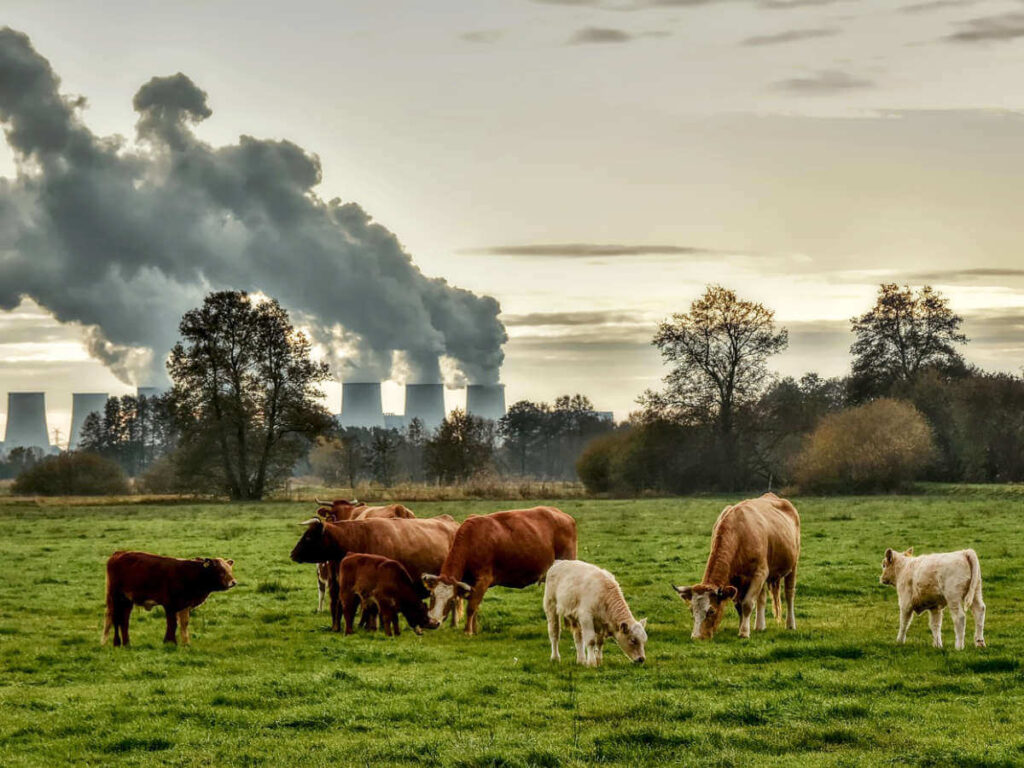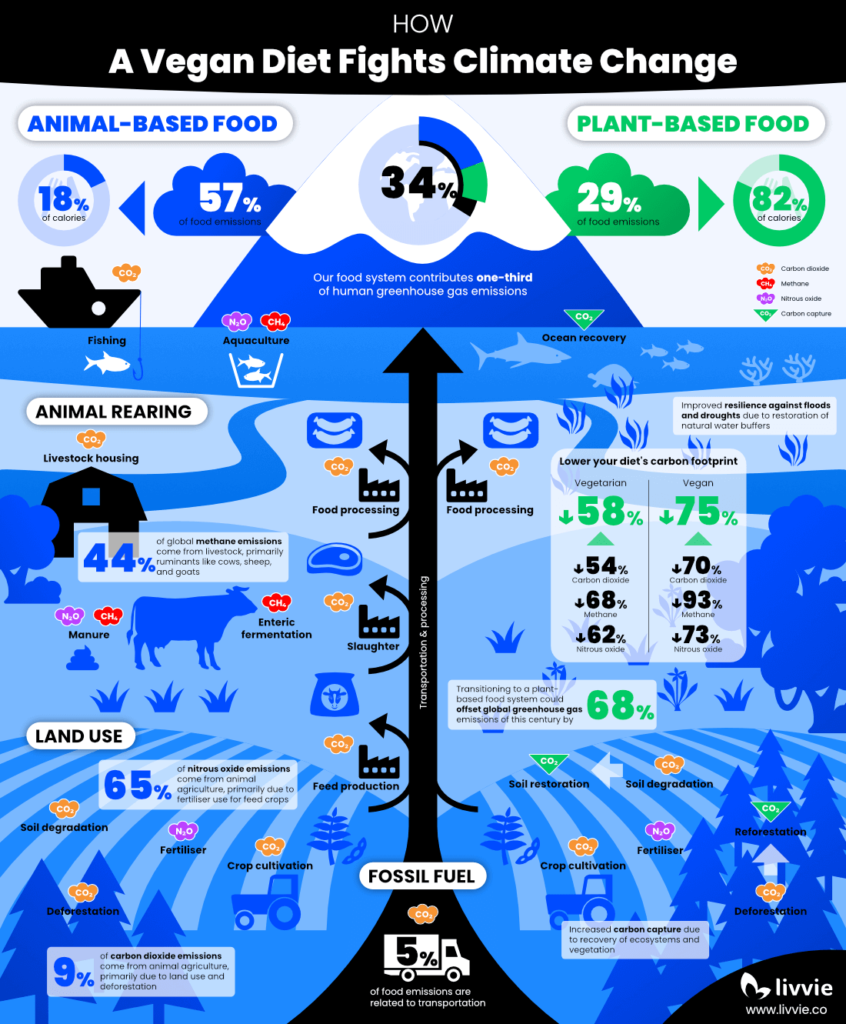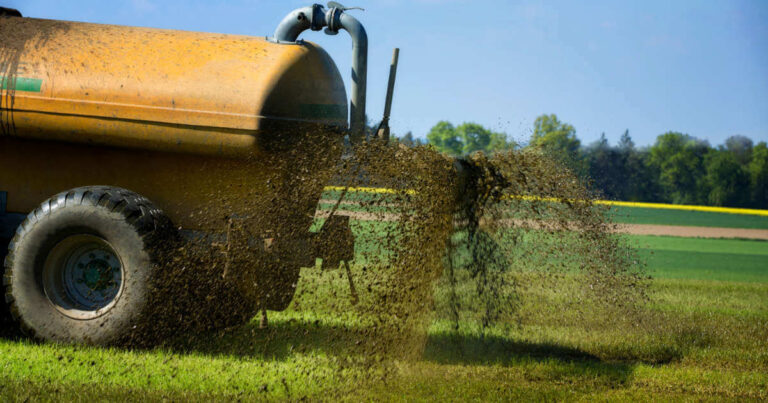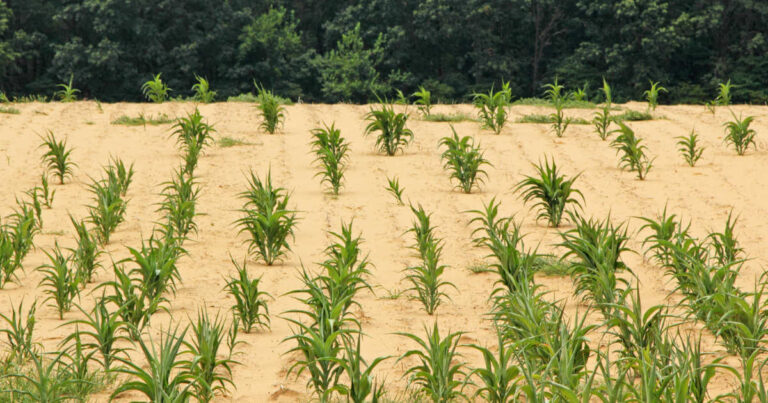Fighting Climate Change With a Vegetarian or Vegan Diet
Written by Johanna van Langen
Published 2 October 2024
Climate change is one of the biggest challenges we face today, threatening ecosystems and communities around the world. Our food system is a major contributor to this crisis, particularly driven by the greenhouse gas emissions and environmental degradation caused by animal agriculture.
By eating plant-based foods more often, you can significantly reduce your carbon footprint and contribute to a more sustainable future. In this article, you’ll discover how a vegetarian or vegan diet helps mitigate climate change and strengthen the planet’s resilience against its consequences.

Track how your food choices help fight climate change
1. Reduce Carbon Dioxide Emissions From Animal Agriculture
Carbon dioxide (CO2) accounts for 76% of all greenhouse gas emissions over the past decade, with animal agriculture as a key contributor. Once released, carbon dioxide remains in the atmosphere for hundreds of years, continually driving global warming. The production of animal-based foods demands large amounts of land and energy, leading to substantial emissions from deforestation and fossil fuel use. By eating more plant-based food, you can significantly reduce your emissions as a vegan diet emits 70% less carbon dioxide and a vegetarian diet 54% less.
Less Deforestation for Livestock Grazing and Feed Crops
Livestock farming is one of the leading causes of deforestation as large areas of land are cleared to create grazing pastures and grow feed crops like soybeans. Plants capture carbon dioxide through photosynthesis with forests and healthy soils acting as natural carbon sinks. However, when forests and vegetation are cleared for agriculture, their stored carbon dioxide is released into the atmosphere, accelerating global warming.
Deforestation is responsible for 12% of global greenhouse gas emissions, with animal agriculture as a main driver. The inefficiency of converting plant-based feed into animal products is the reason why livestock farming consumes 80% of agricultural land, despite producing only 18% of global calories. By adopting a vegetarian or vegan diet, you can reduce the demand for land-intensive animal farming, lowering carbon dioxide emissions from deforestation.
Reduced Reliance on Fossil Fuel in the Supply Chain
The production of animal-based foods relies heavily on fossil fuels at every stage of the supply chain. Heavy machinery is used to grow and harvest feed crops, which are then transported and processed into animal feed. Livestock are housed in facilities that require lighting, heating, and ventilation, all of which consume energy. Once animals are raised, they are transported to slaughterhouses, followed by food manufacturers, where more energy is used for processing, refrigerating, and packaging.
The fishing and aquaculture industry similarly rely heavily on fossil energy, contributing to carbon dioxide emissions and climate change.
Transportation across the supply chain accounts for only 5% of food-related greenhouse gas emissions. This means that eating local products has a limited impact compared to the significant impact of eating more plant-based foods. By choosing a vegetarian or vegan diet, you reduce the need for energy-intensive animal farming, lowering fossil fuel use and your carbon footprint.

2. Avoid Methane Emissions From Livestock
Methane (CH4) accounts for 19% of human-related greenhouse gas emissions, with livestock farming as the largest source, responsible for 44%. Methane is a potent greenhouse gas with a global warming potential 28 times higher than carbon dioxide. Unlike carbon dioxide, methane remains in the atmosphere for only 12 years, so reducing methane emissions can have a rapid impact on slowing climate change.
Ruminant animals like cows, sheep, and goats are responsible for 90% of methane emissions from livestock farming. Through a process called enteric fermentation, microorganisms in their stomachs break down plant material, releasing methane into the atmosphere through burping and flatulence. Additionally, when manure is stored in low-oxygen environments, such as lagoons or waste tanks, it decomposes and produces more methane.
By reducing or eliminating meat and dairy consumption, particularly from ruminants, you can substantially reduce methane emissions. A vegetarian diet reduces your diet’s methane emissions by 68% and a vegan diet even by 93%. Since methane is short-lived, switching to a vegetarian or vegan diet can make a meaningful difference in the fight against climate change in the short term.
3. Lower Nitrous Oxide From Fertiliser and Manure
Nitrous oxide (N2O) is a powerful greenhouse gas, with a global warming potential 265 times higher than carbon dioxide. Although it contributes only 5% of total emissions, nitrous oxide remains in the atmosphere for 121 years, making a significant impact on climate change. Animal agriculture is responsible for 65% of human-related nitrous oxide emissions, primarily from fertiliser use and livestock manure. By eating vegetarian or vegan, you can reduce the nitrous oxide emissions of your diet by 62% and 73%, respectively.
Less Fertiliser Use for Crops
Fertilisers, both synthetic and organic, are rich in nitrogen which helps plants grow. However, only half of the nitrogen applied to fields is absorbed by the crops. The remainder seeps into the soil, where bacteria convert it into nitrous oxide, driving climate change.
Animal agriculture relies heavily on fertiliser to grow the large amounts of feed crops needed to sustain livestock. This increased fertiliser use leads to more nitrous oxide emissions, contributing to global warming. By choosing plant-based foods which require far less land and fertiliser, you help reduce the need for intensive farming and lower nitrous oxide emissions.
Decreased Emissions From Livestock Manure
Manure from livestock, especially from intensive farming, is another source of nitrous oxide. When manure is spread on fields as fertiliser or stored in large quantities, the nitrogen it contains is converted into nitrous oxide by soil bacteria. This is particularly problematic in large-scale farming, where the volume of manure overwhelms the land’s capacity to absorb it, resulting in high emissions and soil degradation.
Reducing or avoiding meat and dairy consumption, particularly from large-scale livestock farms, can significantly decrease nitrous oxide emissions. A vegan diet eliminates livestock manure production entirely and supports more sustainable farming practices.

4. Increase Nature’s Capacity to Capture Carbon Dioxide
Capturing carbon dioxide from the atmosphere is essential to offset greenhouse gas emissions and mitigate climate change. Forests, soils, and oceans act as natural carbon sinks which absorb and store carbon dioxide. Together, these carbon sinks absorb half of the human-caused greenhouse gas emissions. However, animal agriculture and unsustainable practices damage these vital systems, reducing their ability to sequester carbon. By adopting a vegetarian or vegan diet, you can help restore ecosystems and enhance their capacity to capture carbon, contributing to the fight against climate change.
Promote Reforestation
Forests are one of the most important carbon sinks on Earth, capturing carbon dioxide through photosynthesis and storing it in trees and vegetation. Animal agriculture is the leading cause of deforestation, as large areas of forest are cleared for grazing land and feed crops. When forests are destroyed, not only is the stored carbon released, but the land also loses its capacity to remove carbon dioxide from the atmosphere.
By reducing meat consumption or adopting a vegetarian or vegan diet, you help decrease the demand for land-intensive livestock farming. This allows forests to recover and capture more carbon, while restoring biodiversity.
Prevent Soil Degradation
Soils store more carbon than all the world’s forests combined, making them another critical carbon sink. Healthy soils, rich in organic matter, absorb carbon dioxide from the atmosphere, reducing greenhouse gas concentration. However, intensive agriculture, in particular livestock farming, causes soil degradation through overgrazing, erosion, and the overuse of fertiliser and pesticides, which releases stored carbon dioxide back into the atmosphere. Shifting towards plant-based agriculture and sustainable farming practices improves soil health and increases its ability to capture carbon.
Protect Oceans
Oceans play a crucial role in regulating the global climate, absorbing 23% of human-related carbon dioxide emissions and 90% of excess heat. Healthy marine ecosystems, such as mangroves, seagrass meadows, and coral reefs, help capture carbon dioxide and store it in the ocean’s biomass.
Unfortunately, ocean ecosystems and their ability to capture carbon are compromised by our food system and global warming itself. Fishing practices and pollution from livestock and fish farming disrupt marine habitats and their biodiversity. Additionally, excess carbon dioxide from the atmosphere dissolves in oceanwater, causing acidification which particularly threatens coral reefs.
Switching to a plant-based diet reduces the pressure on marine ecosystems by minimising overfishing and pollution from animal agriculture, allowing oceans to maintain their critical role as carbon sinks.
5. Improve Resilience Against the Consequences of Climate Change
Climate change is already affecting ecosystems, food systems, and communities worldwide. Rising temperatures, extreme weather, and shifting ecosystems are straining the environment, economies, and human health. Scientists warn that exceeding 1,5°C global warming could trigger irreversible climate changes. With temperatures already 1,1°C higher than pre-industrial levels and rising by 0,2°C per decade, this is a likely scenario, making climate action urgent.
While reducing emissions is crucial, building resilience against the unavoidable consequences of climate change is equally important. Besides emitting high levels of greenhouse gases, animal agriculture aggravates other environmental issues that amplify the impact of climate change. By choosing a vegetarian or vegan diet, you improve climate resilience by supporting sustainable land use, water conservation, and healthier ecosystems.

Increase Resilience Against Water Scarcity and Desertification
Climate change is causing more frequent and intense heatwaves, resulting in droughts, water shortages, and desertification. Agriculture is the biggest consumer of fresh water, particularly for livestock farming, placing pressure on already vulnerable water resources in drought-prone regions.
Forests and soils rich in vegetation play a vital role in the global freshwater cycle, by absorbing and storing rainwater. Animal agriculture is a leading cause of deforestation and soil degradation, disrupting the ability of ecosystems to retain water and replenish natural freshwater supplies. The roots of trees and plants also stabilise soils, protecting land from erosion and desertification caused by increasing temperatures and droughts.
Choosing plant-based foods significantly reduces your water footprint, as they require much less water than meat or dairy products. Plant-based agriculture also helps preserve forests and healthy soils, safeguarding their capacity to store water and protect against desertification. With a vegetarian or vegan diet, you help conserve water and improve resilience of the environment and our food system against climate-driven water scarcity.
Prevent Floods Caused by Climate Change
Floods are becoming more common and severe due to climate change, driven by heavier rainfall, rising sea levels, and melting snow. These floods cause extensive damage to infrastructure, agricultural land, and ecosystems, putting both human and animal lives at risk.
Forests, healthy soils, and coastal ecosystems act as natural buffers against floods by absorbing excess water from heavy rainfall, rapidly melting snow, and rising sea levels. The root networks of trees and plants also protect against erosion, a common consequence of floods. However, animal agriculture drives deforestation, soil degradation, and eutrophication which weaken these natural defences and leaving ecosystems and farmland more vulnerable to flooding.
By reducing meat consumption or adopting a vegan diet, you support reforestation and ecosystem health, helping to reduce the severity of floods caused by climate change.
A Vegetarian or Vegan Diet Helps Fight Climate Change
Our food system emits 18 Gt CO2 equivalents of greenhouse gas annually, contributing 34% of global emissions. Animal agriculture accounts for 57% of those emissions despite producing only 18% of global calories, while plant-based foods account for just 29% of emissions. Transitioning towards a plant-based food system is therefore essential to mitigate climate change and can provide half of the emission reductions needed to keep global warming below 2°C.
Adopting a vegetarian or vegan diet is one of the most effective ways to fight climate change, reducing your diet’s carbon footprint by 58% or 75%, respectively. Beyond cutting greenhouse gas emissions, a plant-based diet also enhances nature’s ability to capture carbon and strengthens ecosystem resilience against the consequences of climate change.
Every food choice is an opportunity to take action against climate change, whether by reducing your meat consumption or embracing a vegan lifestyle. Track the impact of your diet on your carbon footprint with the Livvie diet impact calculator.
Share this article to inspire others to make sustainable food choices that help mitigate climate change.
Track Your Impact
Inspire your vegetarian or vegan food choices by calculating your impact on 22 parameters.


